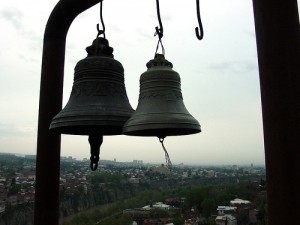Romans 15:1-7
We who are strong have an obligation to bear with the failings of the weak, and not to please ourselves. Let each of us please his neighbor for his good, to build him up. For Christ did not please himself, but as it is written, “The reproaches of those who reproached you fell on me.” For whatever was written in former days was written for our instruction, that through endurance and through the encouragement of the Scriptures we might have hope. May the God of endurance and encouragement grant you to live in such harmony with one another, in accord with Christ Jesus, that together you may with one voice glorify the God and Father of our Lord Jesus Christ. Therefore welcome one another as Christ has welcomed you, for the glory of God.
 Today I have to talk to you about obligation. I say ‘have to’ because no one wants to hear about their obligations. But whether we are aware of them or not, they exist. Being aware of them and living to fulfill them will enable us to make more sense out of our life in the church.
Today I have to talk to you about obligation. I say ‘have to’ because no one wants to hear about their obligations. But whether we are aware of them or not, they exist. Being aware of them and living to fulfill them will enable us to make more sense out of our life in the church.
So, I will talk to you about our obligation as Christians. When God flips that switch in your heart and you see your need for a Savior and then transfer the full weight of your faith and trust onto Jesus Christ to be that Savior and then begin to follow Jesus as your Lord, you assume a debt. Receiving forgiveness, cleansing, justification, adoption and all the blessings of being a Christians obligates you, not to God, but to other Christians.
In today’s passage we will learn specifically about our obligation to weaker Christians.
We who are strong have an obligation to bear with the failings of the weak, and not to please ourselves. (v.1)
 Here Paul is not talking about moral or religious strength, but faith strength (see Romans 14:1 for proof). In the Roman church, the weaker Christians did not have strong enough faith to let go of Jewish religious restrictions and rituals. Among Dulin’s Grove, we don’t argue much over this issue. But the issue of relationships between stronger and weaker Christians is pertinent.
Here Paul is not talking about moral or religious strength, but faith strength (see Romans 14:1 for proof). In the Roman church, the weaker Christians did not have strong enough faith to let go of Jewish religious restrictions and rituals. Among Dulin’s Grove, we don’t argue much over this issue. But the issue of relationships between stronger and weaker Christians is pertinent.
Among Dulin’s Grove there are weaker Christians and stronger Christians. The weaker Christians’ Christianity is about tradition, duty and religious practice and observance. Their entire relationship with Jesus is summed up by going to church once a week with perhaps a few other activities sprinkled on top.
The stronger Christians’ Christianity is about the deep freedom of forgiveness and adoption as sons and daughters of God. For them, their relationship with Jesus is an epic adventure of worship and service and discipleship.
You may be wondering at this point, “Which type of Christian am I?” You’re both (for now, assuming you are a Christian). We are all on our way toward strong faith (this is called sanctification). At every step along the way, there will be weaker Christians behind us and stronger Christians before us. So at any given point in your life as a Christian, you are the stronger brother to some and the weaker brother to others.
With all this in mind, let’s look back into verse one at the two-fold obligation. They are to:
- Bear with the failings of the weak
- Not please ourselves
Weak Christians create weight, and it is the duty of stronger Christians to carry it. That is what “bear with the failings” means. This is not a new concept to siblings. If you had a younger sibling, you know what it is to bear with their failings (weaknesses). You were taller, stronger, understood more and therefore were expected to take up for them. This same dynamic is present in the church.
To “not please ourselves” means to set aside our expectations and desire for satisfaction in relation to weaker Christians. It means an end to grumbling, complaining and gossiping about them. It means an end to avoiding or disregarding them. Weaker Christians will dissatisfy and disappoint you. Expect it and accept it. Here’s what this looks like in practice:
Let each of us please his neighbor for his good, to build him up. (v.2)
It looks like pleasing (satisfying) those around you, for their good, to build them up. Think of this as the two B’s: Bless and build.
When you complain about your church saying, “There are so many weaklings there!” God looks at you and says, “I know. Get to work.” So when you see your weaker brothers and sisters, remember, you are here to bless and build them. Bless and build through prayer, example, encouraging words of truth and grace, and any other way you see fit. This is your obligation as a Christian. And God has given you at least three powerful resources for the task. See if you can spot them in the following four verses:
For Christ did not please himself, but as it is written, “The reproaches of those who reproached you fell on me.” For whatever was written in former days was written for our instruction, that through endurance and through the encouragement of the Scriptures we might have hope. May the God of endurance and encouragement grant you to live in such harmony with one another, in accord with Christ Jesus, that together you may with one voice glorify the God and Father of our Lord Jesus Christ. (v.3-6)
Your resources to fulfill your obligation to bless and build your weaker brothers and sisters are:
- JESUS’ EXAMPLE (v.3). Jesus, the one most worthy of demanding his own satisfaction (and most able to!), chose to bear our weight, and not only the weight of our failings—the weight of our reproaches. A reproach is an insult intended to harm (this is what sin is, and we’ve all done it). If Jesus, who was worthy of pleasing himself, bore our reproaches; surely we, who are unworthy of pleasing ourselves, can bear each other failings.
- SCRIPTURE (v.4). You’ll need instruction, endurance, encouragement and hope in order to live this selflessly. You’ll find rich supply of all four in God’s word. Those rooted therein are more discerning, endure longer, are more encouraged and more fueled by hope in God’s power than those who disregard the Bible.
- PRAYER (v.5-6). At verse five, Paul abruptly transitions into prayer. Let’s take his queue and join him. All that we have seen in this passage is supernatural, requiring God’s divine intervention. You cannot fulfill your obligation on your own power and aren’t expected to. So kneel down with Paul and pray, pray, pray!
Here is the prayer rewritten so that you can pray it in the first person:
Father, you are the God of endurance and encouragement. Please grant us to live in such harmony with one another, in accord with Christ Jesus, that together we may with one voice glorify the God and Father of our Lord Jesus Christ, in whose name I pray, amen.
With these resources and this fresh reminder of our obligation to one another, let us finish with Paul’s conclusion in verse seven:
Therefore welcome (accept) one another as Christ has welcomed you, for the glory of God. (v.7)
Discussion Starters
- Who are “the strong” according to chapter 14? Who are the weak?
- How do the weak fail? How can the strong bear with these failings?
- What are some practical ways we can “not please” ourselves, but please our neighbors?
- How does Jesus’ example in verse three shed light on our obligation to each other?
- Read verse four. What Scriptures have encouraged you or given you hope?
- Take a moment to pray verse five together over your group and our church.
- What one step will you take this week to “welcome one another as Christ has welcomed you”?
- How does welcoming one another glorify God?
Subscribe to the Dulin’s Grove Church Sermon Podcast here.







